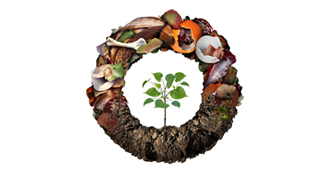
Composting: Grow Your Garden and a Greener Future
Composting is a process that turns organic waste into nutrient-rich soil. The material is decomposed and recycled as a fertilizer and soil amendment and is a key ingredient in organic and natural farming. The resulting fertile soil also has a far greater moisture retention, allowing you to use less water in your garden. The benefit of these efforts is that it reduces the quantity of material sent to landfills, thereby reducing the use of fossil fuels, and the carbon footprint of the campus. Also, aerobic composting, unlike anaerobic landfill humiliation, does not result in the release of methane, a gas that is reported to be 25 times stronger as a global warming medium as carbon dioxide.
What are the benefits to composting?
- - Reduces the amount of waste that we dispose of
- - Enriches the soil and therefore reduces the need for chemical fertilizers. Helps retain moisture and suppress plant diseases and pests.
- - Encourages the production and growth of beneficial bacteria and fungi
- - Reduces methane emissions from landfills and lowers your carbon footprint
- - Fruits and vegetables
- - Coffee grounds and filters
- - Tea bags
- - Nut shells
- - Paper based products
- - Yard trimmings
- - Grass clippings
- - Houseplants
- - Hay and straw
- - Leaves
- - Sawdust
- - Wood chips
- - Cotton
- - Hair and fur
- - Fireplace ashes
- - Start directly on the ground or start with a complete compost to pursuit the microbial activity.
- - Pile in layers rather than vertically. The more surface area you create with your pile, the more efficient the material will decompose.
- - If your compost starts to smell bad, it is simply crying out for air. This is your cue to stab and stir.
- - To pick your compost, remove the unrotted stuff on top and use the finished compost below for your plants.

